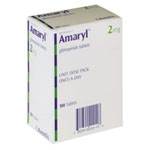 | |
Generic Amaryl 2 mg
| | 24 pastillas - 27.78 EURO (1.16 EURO/pastilla) | Añadir al carrito | | 48 pastillas - 51.67 EURO (1.08 EURO/pastilla) | Añadir al carrito | | 72 pastillas - 66.67 EURO (0.93 EURO/pastilla) | Añadir al carrito |
Amaryl-generic name is glimepiride. It is used to control blood sugar levels.
Para órdenes más grandes la tarifa de envío Registered Mail se aplicarán para cada 100 pastillas.
Para los pedidos con más de 300 pastillas o para las compras Por Mayor, por favor, contactenos a [email protected] para recibir un descuento.
Shipped from: EU
Out of stock |
|
Glimepiride is used with diet and exercise to treat noninsulin-dependent (Type II) diabetes mellitus (NIDDM). Insulin or metformin (Glucophage) may also be used in combination with glimepiride, if necessary.
Glimepiride may also be used for purposes other than those listed in this medication guide.
Treatment with glimepiride may increase the risk of death from cardiovascular disease compared to treatment of diabetes with diet alone or diet plus insulin. Discuss with your doctor the risks and benefits of treatment with glimepiride.
Special precautions
Before taking glimepiride, tell your doctor if you
- have kidney disease;
- have liver disease;
- have thyroid disease;
- have Type 1 diabetes mellitus (insulin-dependent diabetes);
- have a serious infection, illness, or injury; or
- Need surgery.
- You may not be able to take glimepiride, or you may require a dosage adjustment or special monitoring during treatment if you have any of the conditions listed above.
- Glimepiride is in the FDA pregnancy category C. This means that it is not known whether glimepiride will be harmful to an unborn baby. Insulin is usually the drug of choice to control diabetes during pregnancy. Do not take glimepiride without first talking to your doctor if you are pregnant or could become pregnant during treatment.
- It is not known whether glimepiride passes into breast milk. Do not take glimepiride without first talking to your doctor if you are breast-feeding a baby.
- Know the signs and symptoms of low blood sugar (hypoglycemia), which include headache, drowsiness, weakness, dizziness, fast heartbeat, sweating, tremor, and nausea. Carry a piece of hard candy or glucose tablets with you to treat episodes of low blood sugar.
- Follow diet, medication, and exercise routines closely. Changing any of them can affect your blood sugar levels.
- Do not change your dose of glimepiride without first talking to your doctor.
- Avoid alcohol. It lowers blood sugar and may interfere with your diabetes treatment.
Side effects
- Stop taking glimepiride and seek emergency medical attention if you experience an allergic reaction (difficulty breathing; closing of your throat; swelling of your lips, tongue, or face; or hives).
- Other, less serious side effects from glimepiride result mostly from blood sugar levels that are either too high or too low.
- Hypoglycemia or Low blood sugar has the following symptoms:
- shaking;
- headache;
- cold sweats;
- pale, cool skin;
- anxiety; and
- difficulty concentrating.
- Hyperglycemia or High blood sugar has the following symptoms:
- increased thirst,
- increased hunger, and
- increased urination.
- There may be an increased risk of death due to cardiovascular (heart and blood vessels) complications with the use of glimepiride when compared to the treatment of diabetes with diet or diet plus insulin. The long-term use of glimepiride should be discussed with your doctor.
- Side effects other than those listed here may also occur. Talk to your doctor about any side effect that seems unusual or that is especially bothersome.
Keep all appointments with your doctor.
|
|
|

